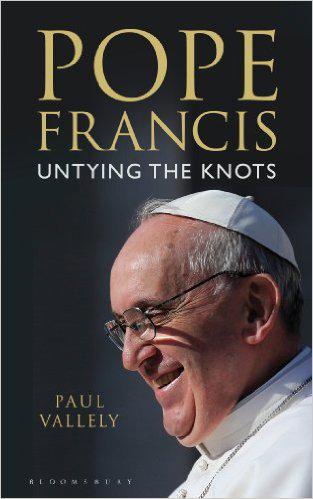|
Book: Pope Francis: Untying the Knots; the Struggle for the Soul of Catholicism - by Paul Vallely (2nd edition)
By Rebecca Tinsley
Pope Francis: Untying the Knots; the Struggle for the Soul of Catholicism This is an emotional roller coaster of a book. Like a cliff-hanging thriller, Vallely describes the institutional challenges facing Pope Francis, and the dark forces working against his attempts to reform the Church, "to let God's Holy Spirit blow where it will along corridors and through rooms which were stuffy and airless." But fans of Francis should beware: Vallely's recounting of Jorge Bergoglio's now-infamous role in the arrest of two priests during Argentina's dirty war will leave the reader unsettled. Equally uncomfortable is the author's examination of the Pope's tardiness in tackling clerical child abuse, and his patronising attitude to women. Yet, Vallely paints a vivid, sympathetic picture of a remarkable man, surrounded by vicious Vatican vipers willing his failure. Anyone of faith reading Francis's words in this volume cannot fail to be moved by the Pope's courage, humility, and decency. Francis's clear articulation of what it means to be a follower of Christ is bracing and life-enhancing to those who want an outwardly-looking, merciful church. Other biographers have mused on how the stern Bergoglio became today's embodiment of love, tolerance and forgiveness. Drawing on interviews with people who have known the Pope for decades, Vallely focuses on Bergoglio's soul-searching exile in Cordoba, and his critical analysis of why he had so misplayed his Jesuit leadership back in Argentina. He finds the roots in the Pope's critique of casino capitalism in the IMF restructuring that devastated Argentina in 2001. Hence his 'Evangelii Gaudium' castigates the trickle-down theories that have never been confirmed by facts, and the crude and naive trust in the goodness of those wielding economic power. Francis prefers "theology of the people," as opposed to Liberation Theology, hoping to avoid class conflict, social theorizing or the political activism the latter implies. He was shaped by the Cold War's polarized context, explains Vallely. Nevertheless, Francis is consistently clear that the church should be talking about the corrupting influence of money, not sex or other "pelvic obsessions." Vallely provides a detailed account of how the Argentine outsider has tackled the structural processes within the Vatican. "Francis was determined to eradicate the Italian dominance over the central administration of the Catholic Church. Previous attempts had always foundered because of the culture of self-serving petty corruption and nepotism within the Curia.....One of the most striking of Francis's reforms has been his conscious attempt to replace this with an Anglo-Saxon model of business practice." Descriptions of the extravagance and sartorial excesses of some clerics might leave the reader feeling queasy. Accordingly, Francis has created a new group of nine cardinal advisors, liberal and conservative, but united in their independence and criticism of the Vatican system. Professor Alberto Melloni, expert on the Second Vatican Council, calls this one move alone, "the most important step in the history of the church in the last 10 centuries." "On the reform of the Curia, he had a clear vision," Vallely writes, "...of transforming the Vatican bureaucracy from the master to the servant of the wider Church. And there too he demonstrated considerable political subtly, working simultaneously on a number of levels." However, "The Italian diehards were finding ways of fighting back. There were dirty tricks, with facts and fictions leaked to the Italian press." Hence, at a traditionally bland year-old talk at the Vatican, the Pope, "accused the churchmen around the hall of an exaggerated sense of self-importance, a lust for power and control, the building of personal empires, sucking up to their superiors and preening themselves when their juniors did the same." One shares His Holiness's frustration on reading of how his reforming efforts are greeted: "Every department in the Curia received a letter asking, "What can you do to devolve matters down to the diocese?" The cardinal read it out to the staff, and before anyone could speak, he said, "Well, in our case, there's nothing really, is there?"" The chapter on the failure to address continuing sex abuse of children is distressing because so little has been done among the non-English/German-speaking nations. Many Italian clerics believe the problem is "Irish" (meaning the Irish spread it to the colonies). The man who emerges from these pages is an ambitious pragmatist who may finally be free to test the limits of his liberating mission, having achieved his goal of becoming pope. "His Jesuit training - and the mistakes of his own personal past - have given him a penetrating insight into community dynamics and also developed in him the self-sufficiency of the lone wolf."
|
.
Any original material on these pages is copyright © BishopAccountability.org 2004. Reproduce freely with attribution.
